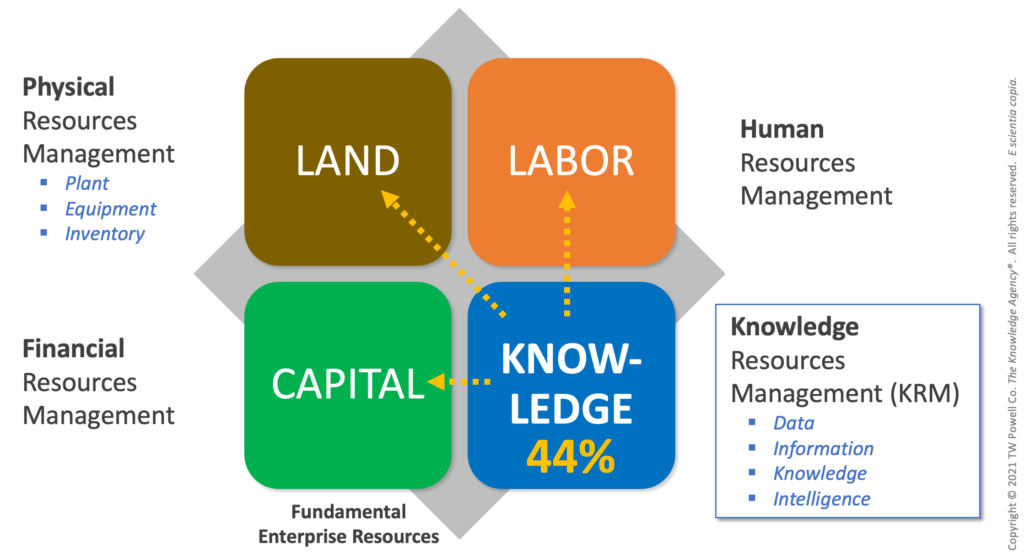
Introducing Knowledge Resources Management (KRM)
In November 2021 I had the honor and pleasure of addressing the annual KM World conference — a group I had not spoken with in more than two decades.
The first part of my talk focused on the ROI of knowledge, which I explore at great length in my latest book The Value of Knowledge — and about which I’ll post here soon.
The second part introduced a construct called Knowledge Resources Management — and which I propose as solution to the “positioning problem” of Knowledge Management (KM).
What KM positioning problem?
It’s no secret that I’ve been distressed at the apparent lack of forward motion in the applied side of the KM field. While the academic side has steadily added to the field — courses, programs, publications, and even endowed chairs — the enterprise world seems largely to have moved on to other pressing concerns.
Why this disparity between theory and practice? I have always suspected that this was, at least in part, due to the discipline’s persistent but awkward name. No less an authority than Larry Prusak has stated publicly that “nobody likes the term KM — primarily because, you can’t manage knowledge.” As usual, Larry nails it exactly. And (even more importantly) I find that clients of KM know this, too — perhaps without even knowing that they know — but sensing the overreach and grandiosity the term implies. Yet a better name that sticks seems to elude us.
What’s in a name, anyway?
In strategic marketing, a name is a key part of positioning — creating and managing the way your client thinks about your product or service. The name itself is a key “handle” on that positioning.
My own feelings about the term knowledge management turned sour on the day in the early 2000s when I heard it being used to describe coercive interrogation techniques then being used on US prisoners in Iraq. Since then, the term “Knowledge Management” leaves me with a slight scent of dystopian science fiction or Orwell’s 1984.
The four enterprise resources
So what’s a better name? We’ll start by backing up — way back. Any students of 18th century classical economics out there? You’ll recognize the three fundamental resource categories of enterprise: Land, Labor, and Capital. Land includes all physical resources — from plant and equipment to inventories of parts and finished goods. Labor includes what we now call “human resources.” And Capital includes financial resources — cash and equivalents, stocks, bonds, derivatives, and so on.
Only since the 1960s has a fourth resource category been formally recognized: Knowledge, also including data, information, and intelligence. Since then knowledge has grown rapidly in importance. Today knowledge capital makes up 44% of total enterprise value on average — with certain industries being much higher than that.
Knowledge Resources Management (KRM)
If “human resources management” were called simply “human management,” it would sound pretty off-putting. By analogy, I propose that moving from KM to KRM makes the field sound less creepy — and could herald its (re)emergence into the boardroom.
To be taken seriously as a discipline of enterprise management, what are the minimum necessary components for a KRM program? Briefly, I submit that these are:
1. An inventory of knowledge resources,
2. An alignment of knowledge resources with enterprise narratives, strategies, and goals,
3. A measurement of the relative return on knowledge assets and activities, and
4. A rebalancing of knowledge resources based on (3) and the ever-changing needs of the enterprise
Each of these steps — further described at The Knowledge Agency — should be conducted rigorously on a recurring, periodic basis. This could, for example, be achieved routinely as part of the annual strategic planning process.
Comments RSS Feed